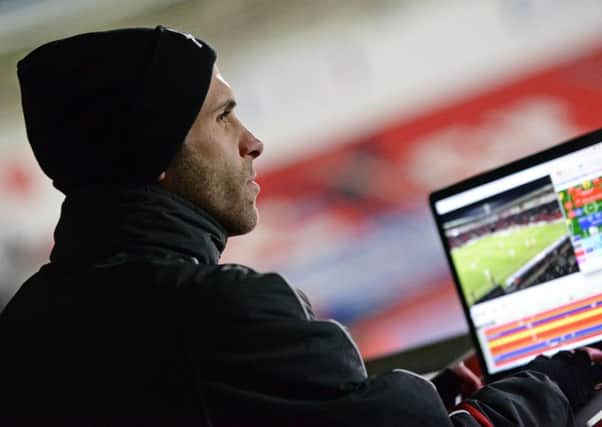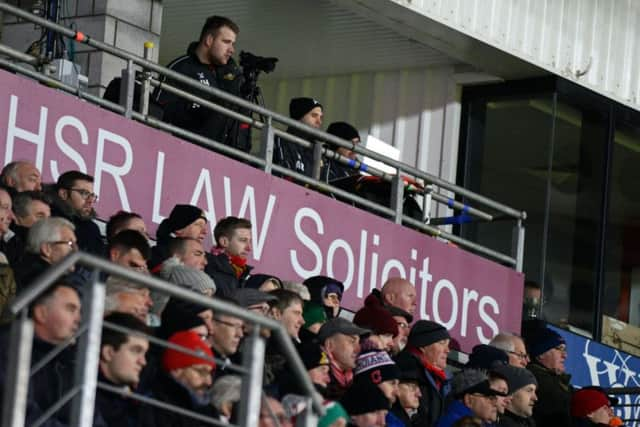Feature: Behind the scenes with Doncaster Rovers' first team analyst Adam Ridgewell


The players and teams of England’s third tier are Ridgewell’s business and he prides himself on knowing anything and everything about which he may be asked.
For Doncaster Rovers, the 30-year-old is the performance analyst, a role of ever-increasing importance in the world of football.


Advertisement
Hide AdAdvertisement
Hide AdRidgewell is the eye in the sky for boss Darren Ferguson during games as well as his researcher and scholar on the opposition in the build-up.
If there is something to be known about the opposition, it is his job to know it.
Building that knowledge requires plenty of research. Before facing any single opposition Ridgewell will have poured over their previous five games.
And driving that research is a great deal of dedication and attention to detail.


Advertisement
Hide AdAdvertisement
Hide Ad“The vast majority of my time is spent watching the opposition,” he said.
“As you’d imagine, watching five games for every opposition plus all the goals they’ve scored and conceded, it’s pretty intense.
“And then you have to double that when you have two games in a week.
“Certainly the amount of time it takes me to do things, that’s probably the hardest part of the job.
Advertisement
Hide AdAdvertisement
Hide Ad“You’ve got to really commit yourself to it because if not you can’t get the level of work done.
“Making those deadlines, and if you screw up you will know about it, there is a massive pressure on.
“You can’t compare yourself to playing because that’s the biggest thing.
“But realistically, if I’m making a one per cent difference then I think I’m doing my job.”
Advertisement
Hide AdAdvertisement
Hide AdIn a sport where the prize for success only increases with each passing year, that one per cent difference is vital.
And that certainly seems to be the driving force behind the growth of analytics.
While lower league clubs will look to get the most out of the minimal resources they can afford to put into the field, the biggest clubs continue to expand analytics departments.
Whatever the level, the managers on board with performance analysis are all looking for the same thing – to get the most out of what they have, or even more.
Advertisement
Hide AdAdvertisement
Hide AdNot only is that within each game, it is also about the progression of individual players.
“I think it is something the gaffer here is massive on - player development and the amount of extra work a player will get,” London-born Ridgewell said.
“Quite often the players will talk about it when they’re interviewed.
“Someone like Andy Butler, the improvement he has made over the last couple of years in his 30s has been incredible.
Advertisement
Hide AdAdvertisement
Hide Ad“He’s shifted to playing a bit more football than he used to, bringing the ball down, making a short pass.
“It’s been really good.”
Immediately after each game, Ridgewell begins putting together video clips for each player individually, on what they have done well and where they could improve.
Footballers may have a reputation – often wrongly – of having fragile egos, but if the group at Doncaster are anything to go by, they are very keen to see where their faults and strengths may lie.
“This group are really good,” Ridgewell said. “If for whatever reason the player clips aren’t on, I will get told about it. I’ll get a text.
Advertisement
Hide AdAdvertisement
Hide Ad“It’s encouraging for me to know it’s getting used by players.
“We don’t do too much on stats but what we do, the players like looking at them.
“And then there’s more detailed stuff which the players don’t see but the coaching staff do.
“Some of the players aren’t into it. Some of them are and will ask for more feedback than others.
“It’s about being able to give them what they want.
Advertisement
Hide AdAdvertisement
Hide Ad“You also tell them what they need because some of them won’t know.
“The players are quite good about it, if there’s something they’re not sure about, they’ll ask. It saves time on the training ground when we can show it them before they go out.”
Analysis is about watching football in a different way – focusing on the small details, looking at what is causing certain things to happen or not happen.
Ridgewell will be perched in the gantry of the ground where Rovers are playing, receiving a live feed of the game on his laptop and in constant contact with the bench to pass on information quickly.
So, what is he looking for?
He said: “It’s on and off the ball stuff.
“It could be runs not being tracked.
Advertisement
Hide AdAdvertisement
Hide Ad“The first step of watching a game is what happened. And the next is what didn’t happen.
“Someone made a run and we didn’t track it but the ball didn’t go there.
“That is not good enough because next time the ball could go there so you want to highlight that.
“You also look at different ideas we might try, like switching the wide players or who we should target at corners.
Advertisement
Hide AdAdvertisement
Hide Ad“The markers might be wrong and different people might have gone in the box but you can correct that straight away.
“You’re looking at quite a lot quite quickly.”
The minor details Ridgewell is tasked with spotting can have a major influence on the outcome of a game.
So when picking up on a trend which helps your team win must provide a significant endorsement of the job done.
“That is the most satisfying thing that happens,” he said.
“Certainly there’s been a few times when a goal has happened coming from something I’ve spotted.
Advertisement
Hide AdAdvertisement
Hide Ad“Even if it’s just chances created, or on the other side when chances aren’t created because we’ve kept a particular player quiet that we’ve worked on.
“One of the first games I did was Swindon away under Dickov. I’d just been at MK Dons who were the last team to beat them.
“Swindon played out from the back that season in a really strange way.
“I knew what MK Dons had done and how it worked so I presented it to the manager about how to deal with it.
Advertisement
Hide AdAdvertisement
Hide Ad“It was a bit odd but we did it and won that day, partly because of that I think.
“If the keeper saves a penalty you can claim a tiny bit of credit for that.
“I’d never claim more than one per cent though.”
Ridgewell expects analytics in football to continue to grow exponentially in years to come, particularly as players who have only ever worked with it move into management.
And proven to produce results, clubs will only be more open to loosening the purse strings for the expansion of departments.
Advertisement
Hide AdAdvertisement
Hide AdBut as clubs push to get the most out of what they have, so do the experts like Ridgewell.
“It gets harder because if there’s only one of me then there’s only so much I can do,” he said.
“I’ve always strived to improve.
“The amount of hours I work is because of the pressure I put on myself.”
Surely it has an impact on his personal life?
“I’ve got a very understanding girlfriend – that helps,” he says with a smile.
Advertisement
Hide AdAdvertisement
Hide Ad“I could watch fewer games and get away with it. But I don’t because I want to be able to answer people’s questions.
“If someone throws a random question at me about a player that hasn’t played in three months, I’ll back myself to know the answer because by the end of the season I’ll have watched 250 League One games.
“I’m going to know the answer to these questions.
“If I don’t know an answer it p****s me off.”
Exactly the sort of person you want on your team – quiz or football.
RIDGEWELL ON MATCHDAYS: “We have a pre-match meeting before the game on the opposition’s weaknesses and where we can hurt them. We do that just before the team sheets are handed in. Once the team sheets go in we work out what system we think the opposition are going to play. There aren’t often too many changes from what we were expecting. And we work out markers for set pieces and that sort of thing. During the game I’m up in the gantry with a live feed into my laptop. I’m on the radio to [assistant manager] Gavin Strachan during the game and hopefully I can give live feedback. You want to be able to affect things in real time. At half time I’ll go down with the laptop and video clips so I can show things to Strachs and the gaffer and if we need to, we can show things to the players. The difference in the second half is usually having information on subs that might come on.”
Advertisement
Hide AdAdvertisement
Hide AdRIDGEWELL IN THE WEEK: “I watch the opposition’s last five games. The scouts usually go to the last two and the coaches will all watch bits as well. We’re pretty well covered on the opposition and based on everyone’s thoughts about them, we pick the clips we want to show them. We have three opposition meetings. One is split into the units – defenders, midfielders and forwards. That is probably the most important because you can go into the most detail that is specific to them. Then we’ll have two group meetings. One on the Friday is what the opposition do and how we’re going to stop them. And the last one is on game day which is the one on their weaknesses. We split it into three meetings but if players want extra stuff we can give them that as well.”
RIDGEWELL ON BECOMING AN ANALYST: “I did a sport degree at Birmingham and while I was there I heard about this as a career path and decided then and there that’s what I wanted to do. I did a bit with Birmingham City and on the back of that decided to do a masters in performance analysis, which was at Cardiff. While I was there I did bits with Bristol Rovers, stuff with the university basketball team. Then I got a job with the FA, working with the youth teams right up to the under 19s so I could name drop a lot of names I’ve worked with.”
Like who?: “Harry Kane would be the most high profile one. It was that time when he was in the 19s. I was doing that part time, and I knew I needed to get a full time job because my degree was nearly done. I started working in cricket for Hawk-Eye, travelling the world doing analysis on that. Any time they put stats on screen, I was doing that sort of thing. Most of the stuff was in the studio doing post match details, enhancement stuff. I knew all along I wanted to work in football and I went to MK Dons, initially in the academy with bits on the first team. Off the back of that I got a job here at Doncaster in 2014.”